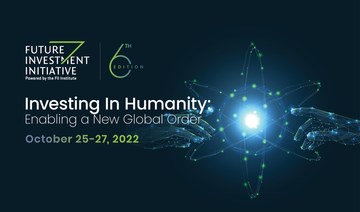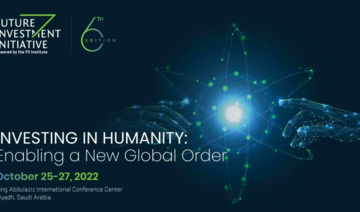RIYADH: Cities are likely to play a pivotal role in shaping the global pursuit of a clean-energy and zero-emissions future. However, experts speaking at the Future Investment Initiative forum in Riyadh on Wednesday felt urban planning first requires an urgent rethink.
The scale of the challenges facing urban populations worldwide is forcing architects, planners and developers to overhaul traditional models for new cities, prioritizing the environment, technology and human well-being.
It is difficult to change existing cities in ways that could address some of their most fundamental problems, for example by introducing more green spaces, pedestrian routes, and advanced technologies designed to reduce waste and overconsumption of resources.
That is why, on the second day of the forum, the agenda included a session intended to re-examine the definition of livability and analyze the possibilities for all-new cities based on completely different designs, values and conceptions.

The future of the world’s urban spaces and ways in which they can be designed to maximize quality of life was one of the topics discussed by experts at the FII in Riyadh on Wednesday. (Supplied)
For much of human history, the majority of people lived in rural communities. By 2050, the global population is expected to reach 9.7 billion, of which about 70 percent will live in urban areas, placing a strain on the planet and communities.
The decades ahead will prove critical to transforming the way people live and what resources are available to them, through the establishment of infrastructure for new forms of energy, mobility and eco-friendly, sustainable lifestyles.
During one FII panel, titled “Designing Cities for 2122,” moderator Nik Gowing, the founder and co-director of Thinking the Unthinkable, an independent project helping leaders to understand the threats and opportunities in the new era of radical uncertainty and disruption, said many people fail to comprehend “how we’re going to cope with huge numbers of people who expect to live somehow in cities, even though the cities are not built to cope with them.”
Mohammed Alabbar, founder of Emaar Properties, said the problems facing the world’s ever-growing cities can only be addressed by adopting sustainable and smart solutions that balance economic and social development through collaborative efforts between the private and public sectors.

Emaar Properties founder Mohammed Alabbar. (Supplied)
“I think everything will be driven by technology,” Alabbar told the panel. “I think we, as human beings, have a massive risk, but we are also very capable.”
Governments around the world are embracing a shift toward building more inclusive, smart and resilient cities. This has led to new planning and governance approaches to create what are perceived as “good” cities.
Although this is somewhat difficult to define, the shift has created a culture of experimentation which is pushing the boundaries of urban planning.
For instance, in Saudi Arabia, several massive development projects are underway, drawing together the various architectural styles found across the Kingdom, embracing archaeological preservation, natural topography and sustainable practices.
Speaking during Wednesday’s panel, David Grover, CEO of Roshn Group, a pioneering real estate developer in the Kingdom and a Public Investment Fund project, said it is important for urban planners to design and construct buildings that can adapt over time to respond to population growth and lifestyle changes, and are properly equipped to address environmental concerns.

Roshn Group CEO David Grover. (Supplied)
“We’re already looking into designs that are 20 percent more efficient than the Saudi building code, so we’re driving energy conservation, driving tech at home so that it can be controlled and monitored remotely, so we think about all that will add a long-term benefit,” said Grover.
Creating new green spaces for pedestrians, prioritizing public-transport infrastructure, installing electric vehicle charging points, and introducing micro-mobility options in the form of e-scooters and e-bikes will help reduce the existing dependence on private vehicles, easing congestion while reducing emissions and air pollution, he added.
For much of the 19th and 20th centuries, urban planning was focused on building ever-denser housing, expanding the traffic network, and incorporating cutting-edge technology, often to the detriment of well-being, the environment, and resources.
Today, computer simulations can help predict what a building, or even an entire city, will look like before construction gets underway, allowing planners to better shape urban spaces and mitigate their footprint.
“The digital twin can replicate what a city will look like and simulate the creation of new infrastructure, the creation of a new district in the city, and the impact it will have from gas emissions, for instance, but also on the overall foundation of the city before taking the decision to build,” said panelist Laurent Germain, CEO of Egis, an international company active in the consulting, construction engineering and mobility service sectors that design and operate intelligent infrastructure and buildings.

Laurent Germain, CEO of Egis, an international company active in the consulting, construction engineering and mobility service sectors. (Supplied)
“Technology will be key for urban planning in the future.”
Japan has begun work on a human-centered smart-city — dubbed “Woven City” — where new automated driving technology, personal mobility, robotics and artificial intelligence will help shift the narrative on how cities of the future ought to work.
Set to be located at the base of Mount Fuji, the prototype city will be powered by a small hydrogen fuel cell system, fit for a population of nearly 350 residents, which could grow to 2,000.

Toyota President and CEO Akio Toyoda reveals plans to build a prototype "city" of the future at the base of Mt. Fuji in Japan during the Consumer Electronics Show (CES) in Las Vegas on January 6, 2020. (AFP)
Saudi Arabia is likewise reinventing the urban experience with its own flagship giga-project, NEOM. The Kingdom’s smart-city, currently taking shape on the Red Sea coast, will be the world’s first cognitive city based on new technological innovations.
Saudi Arabia’s latest project, The Line, is a 170 kilometer-long hyper-connected, linear, car-free city, built to provide essential services to millions of people, all within walking distance.
Urban concepts such as these are designed to adapt to changing habits of living and working.

The Line is a proposed smart linear city in Tabuk province, Saudi Arabia, that will have no cars, no streets, and no carbon emissions. (Courtesy of NEOM)
Indeed, during the COVID-19 pandemic, when lockdown measures forced students and workers to remain home, whole sections of the economy moved entirely online, leaving traditional office spaces and commuter infrastructure largely redundant.
As the trend continues and more of the economy moves into cyberspace, urban spaces will be forced to adapt to changing demands. For traditional, established cities such as Chicago, New York, Houston, Singapore and others, this transformation will not be easy.
That is why many experts and investors are looking to the rising economies of Asia, blessed with a blank canvas, for clues as to the future of urban design.
“The quality of what’s built and the infrastructure will dictate the future of these cities, how successful they’ll be and how they grow,” Barry Sternlicht, chairman and CEO of Starwood Capital Group, a US-based private equity company, told the panel.
“It’s a very interesting and fascinating time for people to think long term.”



























